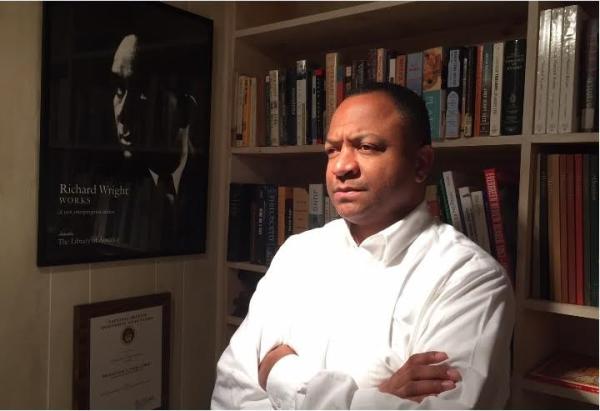We sat down to interview Craig Allen, a PhD candidate who has received the 2015-16 Chateaubriand Fellowship in the Humanities. Each year, the Chateubriand Fellowship offers doctoral students the opportunity to conduct subsidized research in France for a period of 4 to 9 months. Craig will be hosted by the Ecole des Hautes Etudes en Sciences Sociales (School of Advanced Studies in the Social Sciences, located in Paris.
What is your area of interest within American Studies/your dissertation?
My fields are the history of US foreign relations, urban history and theory and 20th Century Literature. My particular area of interest within this is the history of American exile and expatriation.
Were you always interested in American Studies and this particular topic?
As it happens, my journey to American Studies has a lot to do with my interest in American exile and expatriation. I spent my most formative years growing up abroad. This was also true for much of my professional life prior to coming into academia. As such I became aware that my American-ness was informed by its reflection in the eyes of my non-American associates and the foreign contexts in which I lived and worked. The idea that I could devote myself to the study of American expatriation came upon seeing Bertrand Tavernier’s film about an expatriated American jazz musician in 1950s Paris called Round Midnight (1986). I became fascinated with what Americans living abroad take with them internally, in terms of American culture, practices and beliefs and what impact a foreign environment has on this. The American Studies approach is designed to deal with the kinds of history in which questions of culture are central.
Can you explain what the Chateaubriand Fellowship is and what you will be doing?
The Chateaubriand Fellowship is offered by the French government and administered by the French cultural mission to the United States. It is awarded to support PhD students from American universities who seek to engage in research in France. My dissertation explores the impact of American and French government surveillance on three circles of American writers working in Paris after World War II. I will be spending four months at the School for Advanced Studies in the Social Sciences (EHESS) in Paris. During that time I will be conducting research at the Bibliotheque National de France, the Historical Library of the City of Paris, the National Police Archives as well as several privately held papers.
What made you decide to apply?
Doctoral level research requires a sustained presence within the archives central to your topic. If, as in my case, your principal archives are abroad, the time and distance involved in accessing them can seem daunting. I was particularly interested in the Chateaubriand Fellowship not only because it allows for a period of sustained research in France but also because of the linkages it forges between American scholars and their French colleagues and academic institutions.
It was both intense and exciting. The intensity is something familiar to anyone applying for dissertation fellowships. Depending on where one is in the formulation of their question or idea, arriving at a concise expression of your idea for evaluators can be intense. The excitement came for me in expressing these ideas in French and in a way that made clear the centrality of Paris and specific archives in France to my research. I attribute my success in this regard to my dissertation director and Urban History and Theory examiner, Professor Suleiman Osman. Professor Osman insisted that at least one-third of my exam texts be in French and by French historians. When the time came in my application elaborate on the French texts and scholars my research would speak to, I was prepared.
What are you most excited about regarding the fellowship?
The opportunity to work in France under the auspices of such an esteemed institution as EHESS and in partnership with French scholars and archivists in my field(s) is very exciting. I’m also looking forward to discovering the inevitable surprises the French archives yield as they relate to my research.
We have interviewed you before, for the Philip Amsterdam Graduate Teaching Assistant Award. To what do you attribute your success as a PhD candidate?
I thank you for saying as much but I would point out that a PhD candidate’s ultimate success lies in the completion of the dissertation [laughs]. As to anything I’ve been able to accomplish thus far, I attribute it entirely to the faculty in our department. Our faculty has taught, mentored, encouraged, critiqued and supported me beyond my greatest expectations – truly.
What advice can you give to undergraduate or graduate students who may be thinking of pursuing a PhD?
To an undergraduate my advice would be to go do something else first! Hop a train to nowhere, join the Peace Corp, start a business, succeed and more importantly, fail at something – anything else, first. How long would depend on the individual student. To a graduate student I would suggest coming in with a plan that is solid enough to sustain you through the tough moments but flexible enough to absorb the knowledge and apply the tools that a PhD program provides.
What are your plans for the future?
I love teaching, research and writing, so I look forward to joining the professoriate in the United States or Europe. Someday, I also hope to write the first scholarly treatment of Steely Dan. I can’t believe it’s not been done yet…


